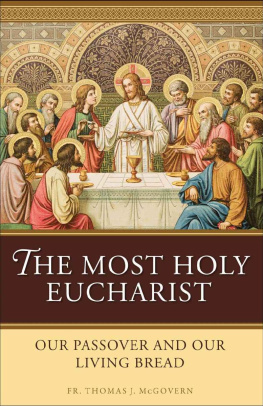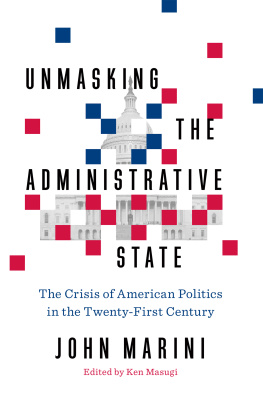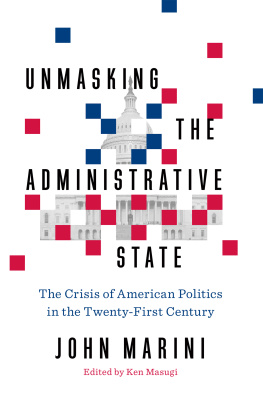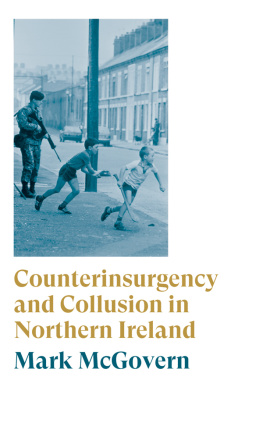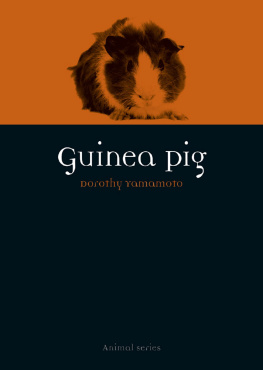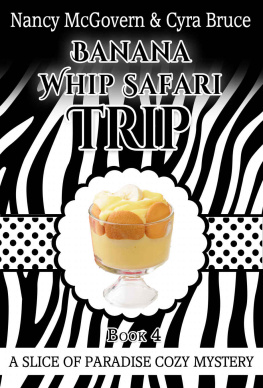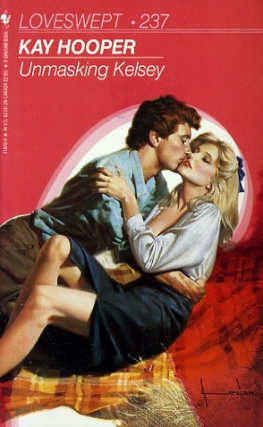Mike McGovern is associate professor of anthropology at the University of Michigan. He is the author of Making War in Cte dlvoire, also published by the University of Chicago Press.
The University of Chicago Press, Chicago 60637
The University of Chicago Press, Ltd., London
2013 by The University of Chicago
All rights reserved. Published 2013.
Printed in the United States of America
22 21 20 19 18 17 16 15 14 13 1 2 3 4 5
ISBN-13: 978-0-226-92509-7 (cloth)
ISBN-13: 978-0-226-92510-3 (paper)
ISBN-13: 978-0-226-92511-0 (e-book)
ISBN-10: 0-226-92509-9 (cloth)
ISBN-10: 0-226-92510-2 (paper)
ISBN-10: 0-226-92511-0 (e-book)
The University of Chicago Press gratefully acknowledges the generous support of the Frederick W. Hilles Publication Fund of Yale University toward the publication of this book.
Library of Congress-Cataloging-in-Publication Data
McGovern, Mike.
Unmasking the state : making Guinea modern / Mike McGovern.
pages. cm.
Includes bibliographical references and index.
ISBN-13: 978-0-226-92509-7 (cloth : alk. paper)
ISBN-10: 0-226-92509-9 (cloth : alk. paper)
ISBN-13: 978-0-226-92510-3 (pbk. : alk. paper)
ISBN-10: 0-226-92510-2 (pbk. : alk. paper)
[etc.]
1. GuineaPolitics and government20th century. I. Title.
DT543.8.M35 2013
966.5203dc23
2012019394

This paper meets the requirements of ANSI/NISO Z39.48-1992 (Permanence of Paper).
Unmasking the State
Making Guinea Modern
MIKE MCGOVERN
The University of Chicago Press
Chicago and London
Any large-scale account of human action has to involve both history and sociology: a narrative of the collective subjects passage through time and an analysis of how that subject is constituted. The former is often regarded as a dynamic dimension and the latter as a static one. And while it can be readily conceded that they are just dimensions, aspects of what is concretely a complex, undecomposable unity, the problem stubbornly remains of how to write about either without the distortion of not simultaneously writing about the other.
J. D. Y. Peel
Marginals stand outside the state by tying themselves to it; they constitute the state locally by fleeing from it. As culturally different subjects they can never be citizens; as culturally different subjects they can never escape citizenship.
Anna Lowenhaupt Tsing
Zusammen gestohlen aus verschiedenem diesem und jenem
Beethoven, autograph to String Quartet in C minor, opus 131
For Margaret and Thomas McGovern
CONTENTS
NOTE ON ORTHOGRAPHY
Loma terms are written using a combination of International Phonetic Alphabet (IPA) and French orthography.
Consonants: For the implosive b, I have retained the French gb (instead of the IPA ). For the voiceless labiovelar stop, I have retained the French kp. However, for the voiced velar fricative, I use the IPA gamma symbol () rather than the French gh.
Vowels: a, e, i, o, and u all occur in Lomagui, and are pronounced as in Spanish or according to IPA conventions (a as in bat; e as in say; i as in meet; o as in know; and u as in glue.
In addition, there are two more vowel sounds in Loma, for which I have used IPA conventions: as in met; and as in not.
I have written Loma words using the definite article, which, in Lomagui, is the suffix i or gi. Plurals are formed by adding the suffix ti to the end of the definite article.
The text also uses a number of terms from the northern Mande languages, namely Maninkakan. Plurals in Maninkakan are formed by adding the suffix lu (sometimes nu) to a word, though in the literature, the Bamanakan pluralization, formed with the suffix w, is more common.
ACKNOWLEDGMENTS
I was told about the case in Texas, but it had happened in another state. It has a single protagonist (though in every story there are thousands of protagonists, visible and invisible, alive and dead).
Jorge Luis Borges
So begins Borgess parable The Ethnographer. In considering my own debts as an ethnographer, I admire his prescience. There are thousands of protagonists in the pages that follow, and it is a pleasure to have the opportunity to thank a few here.
The research was funded at various points by many institutions. The finished product would have been impossible without their help. I thank Emory University, which was always generous both with fellowship and ancillary support; the SSRC International Dissertation Research Fellowship, which funded research in 1997; the SSRC-MacArthur Peace and Security in a Changing World fellowship, which supported research in both England and Guinea between 1997 and 1999; a Fulbright-Hays fellowship, which supported my research in Guinea in 20002001; and a Harry Frank Guggenheim Dissertation Writing Fellowship, which underwrote my writing during 2003. A sabbatical leave and a Yale MacMillan Center Faculty Research Grant allowed me to return for much of the 20082009 academic year to undertake the research that led to of this book.
In Guinea, I would have accomplished nothing without the help of my Guinean colleagues and friends in Macenta Prfecture and in Conakry. Alamako Onepogui, Pepe Bilivogui, and Aboubacar Banks Kourouma worked alongside me at different moments as research colleagues and earned my unending gratitude. Jacques Onivogui was my first French teacher in Guinea and has remained an indispensable guide. Professor Galema Guilavogui facilitated my research at every step and generously shared his thoughts with me about Loma history both when he served as Secretary General of the University Gamal Abdel Nasser and when he served as Minister of National Education. Ambassador Tolo Beavogui, also a historian who has served his country in diverse ways, shared his expertise with me in conversation and correspondence. My friends in Conakry, especially Dr. Serge Mara and Vaba Guilavogui, helped my wife Susan and me in numerous ways. Other friends in Conakry, including El Hadj Tafsir Thiam, Ousmane Barry, Kim Maggio, Gaby Sanoussi, and Martin and Kadi Hartney, also made our time in the capital enjoyable and profitable. I thank M. Ciss and M. Kaba at the National Archives and Dr. Sylla at the Bibliothque Nationale for their generous help. Among my debts to Guinean intellectuals, perhaps none surpasses that to Facinet Beavogui, the brilliant and thorough historian of the Loma-speaking region. I never had a chance to meet him before his untimely death, but I feel as if I have shared many conversations with him about Loma history and culture.
In the forest region, I must start in NZerekore with my old friend Alain Koivogui, friend and palm winedrinking companion. Thanks also to the Bakoly family. In Macenta Prfecture, I thank Gile, Mao, Chinois, Pepe and Doyen Bilivogui, and on the womens side of the family, Loopu Kalivogui, Kulubo Bilivogui, Fanta Kalivogui, and Ouidoh Pivi. On the other side of the village, I thank Bala Pivi, Nyankoye and Parisien Pivi, and Siaka Bilivogui. The late Pokpa Kalivogui and Foromo Kalivogui facilitated my stay. During the research, Oua Bilivogui, Siaka Bilivogui, NZolea Bilivogui, Pascal Pivi, Siba III Kalivogui, and Duogi Pivi were of enormous help. In my second research site, Avit Beavogui and the late Elisabeth Onivogui were my hosts, teachers, and friends during a crucial period in my research. Finally, in the Guekedou area, I relied heavily on the hospitality and assistance of Eddie Keturakis and Khadiatou Diallo. Dominique Millimounou and the team he assembled were fantastic and incredibly hard-working.

 This paper meets the requirements of ANSI/NISO Z39.48-1992 (Permanence of Paper).
This paper meets the requirements of ANSI/NISO Z39.48-1992 (Permanence of Paper).

